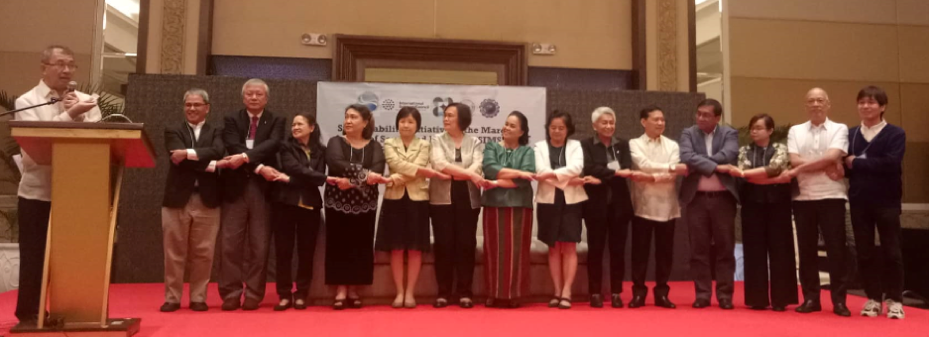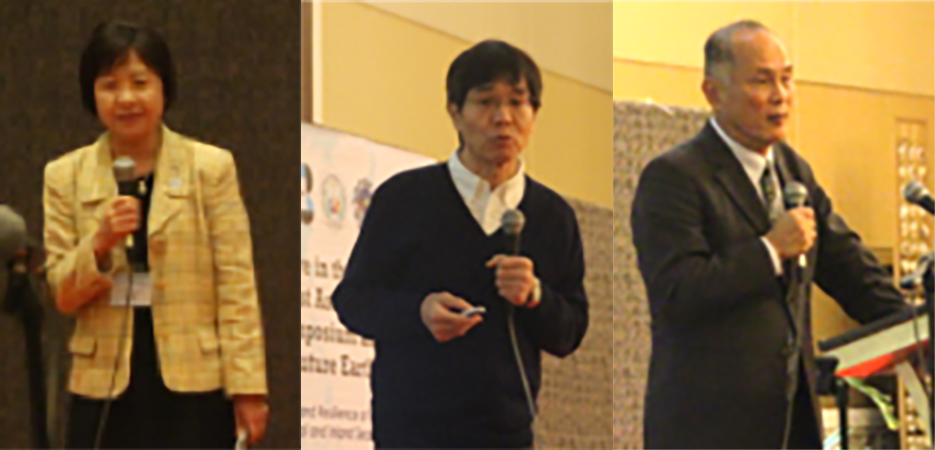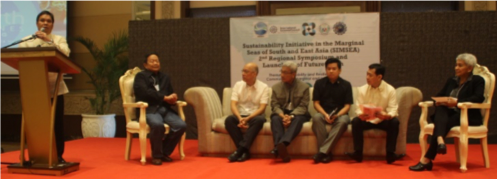Launch of Future Earth Philippines Program sets pace for Philippine sustainability
Quezon City, MM, Philippines – Secretary of the Department of Science and Technology (DOST), Fortunato Dela Peña officially launched the Future Earth Philippines Program (FEPP), describing it as a significant milestone in the country’s effort to attain sustainability (Fig. 1).
The event was held on 19 November 2018 at the Manila Hotel in Manila, Philippines in conjunction with the opening of the 2nd Regional Conference of SIMSEA, the Sustainability Initiative in the Marginal Seas of South and East Asia. The two events were attended by 205 participants from 9 countries including Japan, Malaysia, Australia, New Zealand, Bangladesh, India, Indonesia, China, and the Philippines.
 Figure 1. DOST Secretary Fortunato Dela Peña lead the launching of Future Earth Philippines Program (FEPP) as members and partners joined hands for a strong collaboration among stakeholders. Left to right: DOST Secretary, FT de la Peña; NAST Vice President, FM Dayrit; ISC-RCAP Chair, Mitsuo Uematsu; NRCP Division Chairs, AF Lucero & MNR Dimaano; Director of Future Earth Global-Tokyo Hub, Fumiko Kasuga; National Scientist LJ Cruz; NAST President, RV Azanza; NRCP Executive Director, MB Sumagaysay; Director of ISC-Regional Office for Asia-Pacific, Othman Mazlan; DLSU Professor & NAST Academician, AB Culaba; DOST Undersecretary, RU Solidum; Dean of SESAM UP Los Baños, DVF Eslava; NRCP Division Chair, DEH Del Pilar; Professor of the Research Institute for Humanity and Nature (RIHN), Tatsuyoshi Saijo.
Figure 1. DOST Secretary Fortunato Dela Peña lead the launching of Future Earth Philippines Program (FEPP) as members and partners joined hands for a strong collaboration among stakeholders. Left to right: DOST Secretary, FT de la Peña; NAST Vice President, FM Dayrit; ISC-RCAP Chair, Mitsuo Uematsu; NRCP Division Chairs, AF Lucero & MNR Dimaano; Director of Future Earth Global-Tokyo Hub, Fumiko Kasuga; National Scientist LJ Cruz; NAST President, RV Azanza; NRCP Executive Director, MB Sumagaysay; Director of ISC-Regional Office for Asia-Pacific, Othman Mazlan; DLSU Professor & NAST Academician, AB Culaba; DOST Undersecretary, RU Solidum; Dean of SESAM UP Los Baños, DVF Eslava; NRCP Division Chair, DEH Del Pilar; Professor of the Research Institute for Humanity and Nature (RIHN), Tatsuyoshi Saijo.
FEPP aims to improve the country’s capability to achieve the Sustainable Development Goals (SDGs) through Philippine Knowledge-Action Programs for Sustainability (PKAPS), as it links the country with the Future Earth regional and global initiatives on sustainability.
National Scientist Lourdes Cruz emphasized the urgent need for FEPP because the Philippines has been running on a non-sustainable mode for the past half century. Filipinos must work together to curb deforestation, coral reef destruction, irresponsible mining, unsustainable agriculture and plastic pollution and use a transdisciplinary and inclusive approach to remedy the problems.
Director Fumiko Kasuga, of the Future Earth Global Tokyo Hub, presented the international perspective of Future Earth. Describing the “Great Acceleration” in human activity corresponding to increase in greenhouse levels, ocean acidification, deforestation and biodiversity loss, she emphasized the need for scientific understanding of the emerging environmental and social issues that threaten humans.
 Figure 2. L to R: F. Kasuga, T. Saijo and K. Nadaoka
Figure 2. L to R: F. Kasuga, T. Saijo and K. Nadaoka
Prof. Tatsuyoshi Saijo, of the Research Institute for Humanity and Nature (RIHN), discussed his “Future Design” concept that explores the types of social systems necessary if we are to leave sustainable natural environments and sustainable societies for future generations. The goal is to lower ecological footprint while increasing Human Development Index (HDI).
Prof. Kazuo Nadaoka, of the Tokyo Institute of Technology, discussed the importance of science-based “Blue Carbon Strategy” to counter the on-going loss of mangroves, coral reefs and other marine and coastal ecosystems. Starting with selected communities, the strategy uses capability building in research methodologies for local actions to create global impacts in sustainability.

Figure 3. Panel Discussion: L to R, AMA Lagmay; RF Rañola; DEH Del Pilar; Director Fernando P. Siringan of the Marine Science Institute, UP Diliman; Assistant Secretary, Kristian Ablan of the Presidential Communications Operations Office, AB Culaba; & M Othman of ISC-ROAP.
The panel discussion (Fig. 3) was moderated by Director Alfredo Mahar A. Lagmay of the UP Diliman Resilience Institute (UPRI). Panelists highlighted the importance of collaboration among the various stakeholders; transdisciplinary research involving natural and social scientists, availability and access to relevant data and making science understandable for the youth and stakeholders. Dr. RF Rañola of UP Los Baños and member of the Advisory Committee of Future Earth Asia proposed the creation of a parallel non-government organization for FEPP to raise funds, facilitate implementation and ensure sustainability of FEPP beyond the project period.
The proposal for establishment of FEPP was developed under a DOST-supported project of the National Academy of Science and Technology (NAST) in consultation with the sectoral councils of DOST and representatives of industry and the National Economic Development Authority (NEDA). It was endorsed by the Department of Environment and Natural Resources (DENR), the Department of Agriculture (DA) and the Chamber of Commerce of the Philippines (CCPI). With funds from DOST, it is being implemented by the National Research Council of the Philippines (NRCP) in collaboration with NAST and monitored by the Philippine Council for Industry, Energy, and Emerging Technology Research and Development (PCIEERD).
Learn more at the Future Earth Asia Centre website here.
DATE
January 17, 2019AUTHOR
Future Earth Staff MemberSHARE WITH YOUR NETWORK
RELATED POSTS
Future Earth Taipei Hosts the 2024 Ocean Action Symposium
Call for Abstracts: 2024 Innovate4Cities Conference
Mason University Students Embark on Summer of Research with Future Earth